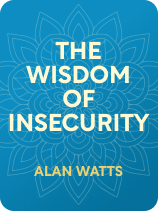

This article is an excerpt from the Shortform book guide to "The Wisdom of Insecurity" by Alan Watts. Shortform has the world's best summaries and analyses of books you should be reading.
Like this article? Sign up for a free trial here.
Why is Eastern spirituality the best solution to mental health issues? What’s Eastern spirituality’s perspective on insecurity?
In The Wisdom of Insecurity, Alan Watts is critical of the Western approach to mental health solutions. Instead, he advises people to turn to Eastern spirituality for help with insecurity and anxiety.
Find out more about the positive link between Eastern spirituality and mental health recovery.
How Eastern Spirituality Helps You Accept Insecurity
Based on his understanding of Eastern spirituality and mental health recovery, Watts says that using religion and science to cope with insecurity is inadequate for a few reasons. First, it strengthens your tendency to identify with your thinking self over your animal self—you believe you can classify experiences because you’re an objective, outside observer. Watts says that you’re not outside of experience—you are your experience. He reasons that if everyone is their experience, then all of existence is composed of experience—which means that you’re part of an ever-changing, unified whole, rather than a stable, independent entity (your thinking self).
(Shortform note: While Watts doesn’t explain which Eastern philosophies he draws from in this book, he notes in another book, The Way of Zen, that Mahayana Buddhism offers similar wisdom. According to the concept of maya in Mahayana Buddhism, the words you use contribute to the illusion that anything is separate from anything else (including your supposed separation from the rest of experience). And according to the Mahayana principle called moksha, you can be liberated from this illusion and come to understand your true self as part of the integrated whole of existence. Mahayana Buddhists believe that moksha enables you to understand and deal with insecurity.)
Second, Watts argues that religion and science are merely representations of existence, so they’ll never be fulfilling; clinging to these representations is like clinging to a photo of your friends instead of to your friends themselves. He adds that though religions attempt to represent existence, existence can’t be understood by the thinking self—it can only be understood experientially by the animal self that’s living in the moment. Trying to name and classify existence as an independent, objective observer removes you from the experience, so you’ll miss out on aspects of the experience. For example, according to this logic, you’d learn more about running by going for a run than you’d learn by reading about running or watching others run.
(Shortform note: Watts believes that the best way to understand life is through experience, but you may not be able to learn everything you need to know through experience. For example, doctors need to know about a variety of illnesses, and they can’t (and probably shouldn’t) contract every known illness to gain that knowledge. In some cases, it’s more helpful to refer to shared human wisdom about how the world works (like religious wisdom or a body of scientific knowledge) than to rely on your own experience. However, experience can be a useful teacher—and some experts suggest that to maximize your learning, it’s best to pair experience with reflection.)
Finally, imposing order on existence by accepting religious or scientific beliefs is a form of your thinking self’s resistance to change, and Watts argues that it’s only by accepting insecurity that you can find spiritual understanding and fulfillment. He says you can have spiritually meaningful experiences when your animal self is living in the moment and your thinking self admires the incomprehensible beauty of existence—a phenomenon he refers to as “wonder.”
(Shortform note: In Radical Acceptance, Buddhist psychologist Tara Brach offers some concrete advice to help you accept hardships like insecurity. This includes asking yourself questions about your feelings to help you understand them better, welcoming your fears once you understand them to make it easier for them to pass by, and finding refuge in the Buddha, the world’s natural laws, and/or your community. Some psychologists believe that experiencing wonder helps you deal with hardships like insecurity, too, by buttressing your sense of belonging in the world—to help your sense of wonder develop, they recommend spending time alone in nature.)
However, Watts says that traditional religious beliefs are useful when understood metaphorically. He explains that everything that exists is intricately, irrevocably interdependent and that all iterations of God, in all religions, symbolize the essential unity of all of existence. He encourages you to think of the Christian notion of an eternal afterlife where you’re joined with God as a metaphor—one that symbolizes that the present is the only thing you can ever experience and that you’re always already joined with all other existence.
(Shortform note: Here, Watts draws a connection between Christianity and Eastern religious beliefs. Zen Buddhist Thich Nhat Hanh echoes this in Living Buddha, Living Christ, arguing that Christianity and Buddhism both conceive of death as something that dissolves the individual self and joins you with the divine. This thinking is also shared by the Baha’i faith, which teaches that all religions worship the same divine essence, albeit under different names, which represents the oneness of existence. However, some Christians argue against this kind of thinking because they believe lending credence to other religions is heretical or that the Bible should be understood strictly literally, not metaphorically.)

———End of Preview———
Like what you just read? Read the rest of the world's best book summary and analysis of Alan Watts's "The Wisdom of Insecurity" at Shortform.
Here's what you'll find in our full The Wisdom of Insecurity summary:
- Philosopher Alan Watts's treatise on the origins and solutions to anxieties
- Why seeking security makes us anxious and how to accept insecurity
- How Eastern religions can help anxiety and Western ones make it worse






